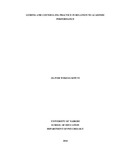| dc.description.abstract | This study was based on establishing the influence of guiding and counselling practice
as applied in secondary school in relation to strategies towards academic excellence.
The objectives were: to determine the effect of peer guiding and counselling in
relation to academic performance, access its impact towards subject and career
choices, determine the influence of discipline counselling towards performance and
its effect on personal, social and moral challenges.
The study adopted a descriptive research design. The target population comprised of
Quality Assurance Officers, teachers and students in secondary schools in Bungoma
County. The instrument used to collect data was a questionnaire. Data was analyzed
using quantitative statistics and presented using tables and graphs with the aid of
SPSS.
The results show that, guiding and counselling as practised does not meet the required
standards of what is desired in academic performance. This has a direct bearing on
human development that is related to what is effective practice regarding vision and
mission of schooling: the self and self-conceptualization process for mastery of
development tasks. These are agents of what constitutes comprehensive guidance and
counselling practice. Further without access to counselling programmes, the self and
self-actualization are jeopardized more so towards self-actualization, belonging,
safety and expectation as a drive. Also, lack of visibility of counselling programmes
poses a challenge, as this reflects lack of recognition. There is need to review
guidance and counselling practices with the view of ensuring they meet the
professional standards that lead to academic excellence thus performance. The
recommendations are tailored towards guiding policy and mandating the practice.
The study recommended that there should be a national policy put in place, to enable
teacher training colleges and secondary schools have guiding and counselling
included in their curriculum. In addition, the Ministry of Education should come up
with alternative means of discipline in place of the corporal punishment that has been
abolished and organize seminars to sensitize the teachers and students on a
comprehensive practice of guiding and counselling. More than anything it should be
comprehensive and should go beyond mere career guidance to disciplinary issues,
personal-social-moral as well as support learning | en_US |

